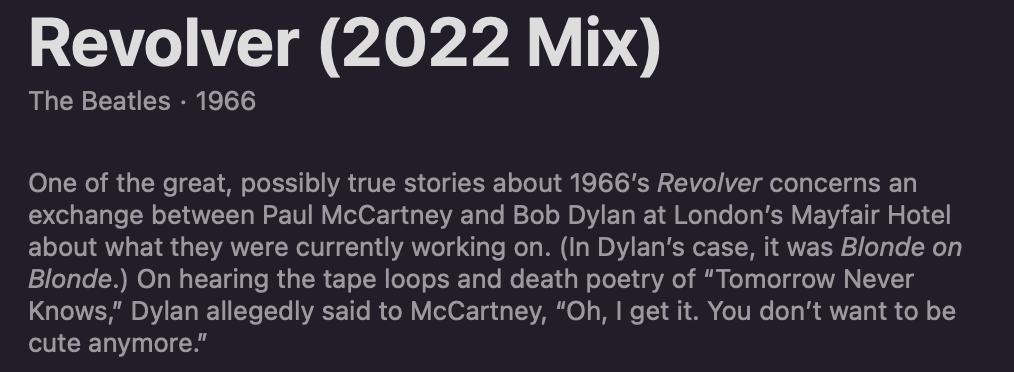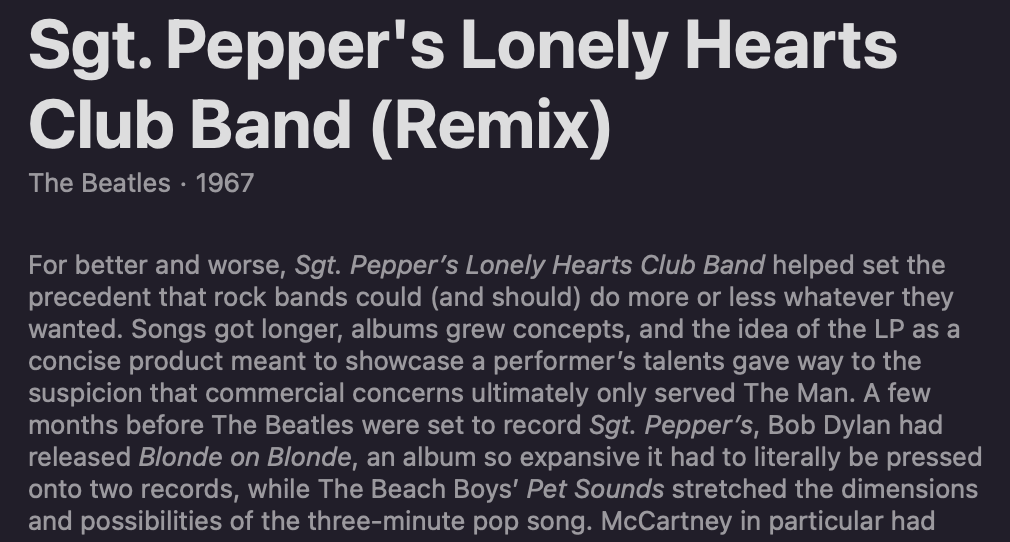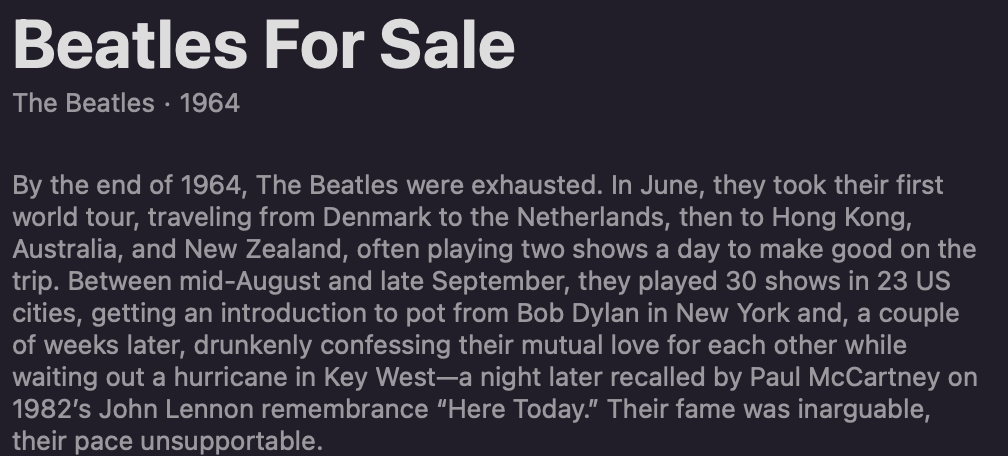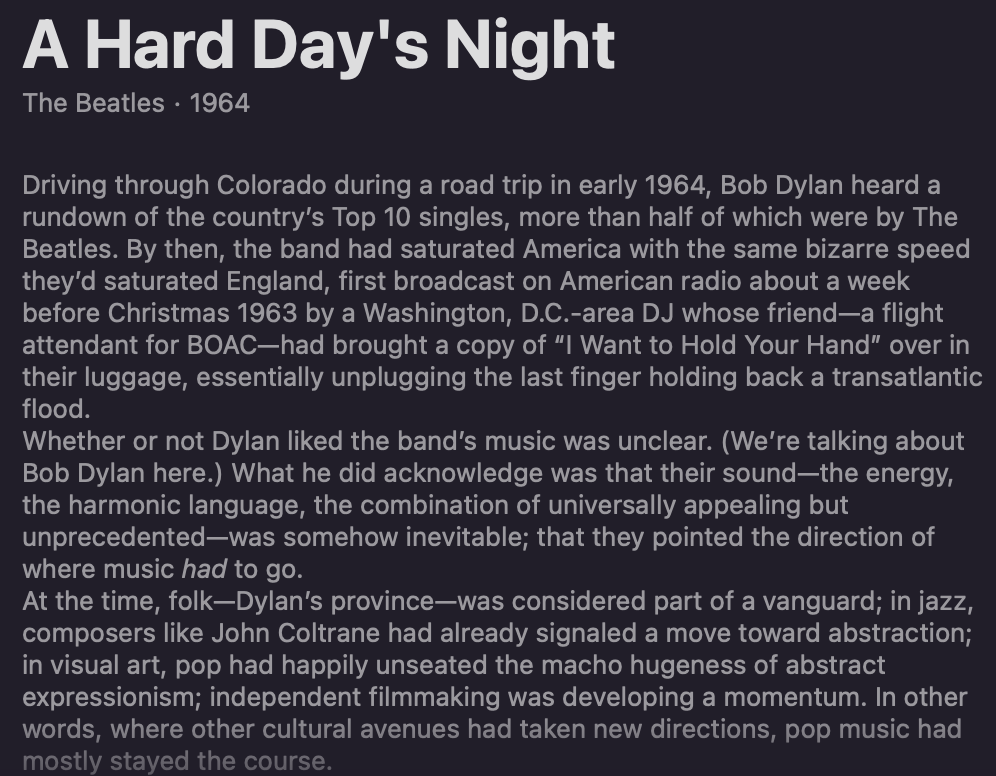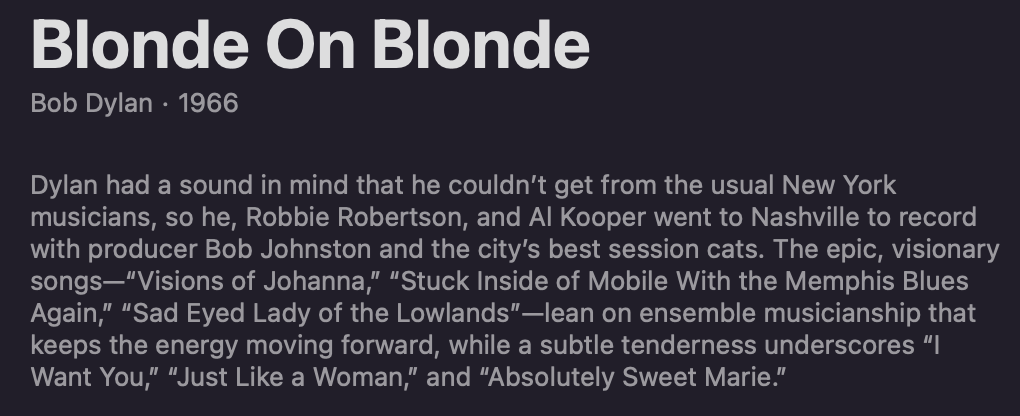Doctor Who and The Devil’s Chord
First: what a great title!
If “Space Babies” was about re-establishing what median-value Doctor Who is like and getting everyone back on board, “The Devil’s Chord” seems like it’s about building out from that and establishing how the show is going to work going forward. Because as soon as The Maestro climbs out of that piano, it’s clear we’re operating in a different gear—excuse me—different key than we have before. Between this and the previous, theres a real sense of “mission statement”: this is the vibe Doctor Who is going for in this iteration. Evil drag queen space gods eating the concept of Music and destroying the future? Yes, please. We’re miles away from anything else on Disney+, or anywhere else on TV.
This is also where Gatwa’s and Davies’s take on the character is starting to come into focus. Back at Christmas and then in “The Space Babies” the take on the character was basically “big and fun.” And this stays true here, the Doctor’s excitement over where Ruby wants to go is a standout, and also feels like Davies riffing on the last time he was relaunching the show, where the first place the new companion wanted to go was to watch their dad get killed in a car accident? Finally, as he says, they want to go somewhere fun.
But I’m starting to run out of ways to phrase “this is all really fun!”, so fortunately this is where they start—and I’m sorry but I can’t help myself—adding more notes to the character. Presumably we’ll all be writing “this is when they really cracked the character” pieces next week, but for the moment two observations:
The second most interesting of these is when the Doctor realizes who or what they’re dealing with, and his response is to just… run away. The scene where they’re hiding from The Maestro and the Doctor makes a sound-proof zone to cover their tracks is probably the most effective sequence in any of Gatwa’s time so far.
“Scared” isn’t usually an emotional state the Doctor operates in, for solid structural reasons if nothing else. Doctor Who is frequently a scary show, and it’s sweet spot is right out at the edge of what the younger audience is capable of handling. But one of the things that lets Doctor Who get away with operating that far out on the ice is the character of the Doctor themselves. The Doctor is effectively indestructible, nearly always wins, and almost never scared, so they provide a real emotional safety net for the younger audience—The Doctor is here, so this is all going to be okay. Obviously we’ll see where this goes, but combined with them running away from the monster in “The Space Babies” as well, this take on the character seems to be centering on “enthusiastic but scares easy,” which is a fascinating take.
The most interesting scene, though, was the bit where he mentions that he and his granddaughter are currently living on the other side of town. Gatwa takes an interesting angle on the scene, and rather than sad or wistful, he plays the Doctor as basically cheered up by the idea that she was out there, regardless of where she is now. Unlike the last time Davies was show-running, this clearly isn’t a character that’s going to stand crying out in the rain.
This is, I think, the first time Susan has been mentioned by name in the 21st century version of the show. Like the premise speed-run in the previous episode, or the re-staging of the ruined future scene from “Pyramids of Mars” in this one, this feels less like a deep-cut continuity reference than a combination of making clear what elements of the show are in play while also deliberately hanging some guns over the mantle. Add to that the name drop of The Rani last week, and the not one but two mysterious women lurking around in the background of these last couple of shows, and clearly something is up. I’m going to refuse to speculate further, sine Davies likes to drop in these crumbs but never before built up a mystery that was solvable, these are always things that can’t make sense until the context of whatever the big-ticket finale does in June. But! Fun spotting the things that will make more sense on the rewatch regardless.
Because I grew up in a very Beatles-centric house, a few notes on the boys from Liverpool themselves. Lennon didn’t start wearing that style of round glasses until much later, but I understand wanting to flag “which one is John” with his most signature feature considering how little the actors look like the real people. I was hoping the the secret chord was going to turn out to be the mysterious opening chord of A Hard Day's Night. And look, if it had been me, I’d have had Harrison be the one to solve the puzzle.
Finally, the ending dance sequence looks like it was a lot more fun to make than it was to watch, mostly because that song wasn’t nearly good enough to spend, what, three whole minutes on? I think I see what they’re trying to do, but more than anything it had the quality that they had under-run and needed to pad out the show.
But, it was big and fun, and one of the all-time great cinematic battles of Ham vs Ham since Shatner and Montalban squared off. Jinkx Monsoon clearly looked at what Neal Patrick Harris did back in December and thought, “I can beat that.”
Were these two premiere episodes the best episodes of Doctor Who ever? No. But they’re more entertaining than the show has been in years, and it’s been even longer since it’s had this clear a vision of itself. In the six stories since November, we’ve gone from a 2008 revival piece to tuning up a whole new instrument. And then next week they’re handing it to the best person that’s ever played it…
Apple Music vs(?) The Beatles
Thanks to the “new” song, the Beatles have made there way back into regular rotation around Icecano Headquarters. Back during iTunes’ “Rip. Mix. Burn.” period I had a carefully curated set of MP3s I ripped from CD and painfully filled in all the ID3 tags. (For context, this was just after the last elf had sailed over the sea).
I used to use this as a way to describe both my first iPod and first iPhone—“Look! You can fit every Beatles song on here!!” Somewhere along the line, those MP3s got replaced with the iTunes Match upgraded versions.
But that was all few iPhones back; these days I’m mostly an Apple Music user (while those old MP3s sit on my post-Ragnarok Drobo.)
Overall, I like Apple Music a lot. Sure, vendor ecosystem lock-in and all, but the music sounds great, doesn’t cost too much for the family plan, and it works with all of my gear.
As I recall, it was kind of a big deal when the Beatles finally made it into Apple Music—they were one of the last holdouts, and Apple made quite a splash when it finally happened. And you can tell! All albums have slightly animated cover art—the lines on Magical Mystery Tour alternate colors, the line art caricatures of the four of them on Revolver blink and look side to side. Apple also has the new(er) remixes and remasters in addition to the original flavors, the new edits, especially Abbey Road, sound great; sounds like it could have been recorded last week instead of 50-plus years ago. (There’s a few songs here and there that don’t sound quite like I remember them, but sure.)
Which all brings me to the point: one of the other things I like Apple Apple Music the editorial stuff: curated playlists, recommendations, editorial notes. (I think in general the music editorial stuff is better than its counterparts in say, the app stores.). So, having not really poked around in the Beatles catalog in Apple Music, I was curious about what the anonymous apple music editors would have to say about the Beatles’ albums. What even new was there to say that hadn’t already been said? But, given how much attention they drew to the Beatles arriving on the service, they must have made the effort to do something.
Faced with this challenge, Apple found an absolutely innovative, if deranged, solution: hire someone who doesn’t really like the Beatles, but loves Bob Dylan.
I know, you think I am exaggerating. So, for example, check out the start of the description of Revolver, which might be their best album:
That’s… an absolutely insane way to start. Why is Bob Dylan’s probably-apocryphal backhanded compliment the lede of the description of Revolver?
(For the record, these are only excerpts, the full descriptions go on and on and on. Apple Music subscribers can verify read the rest as an exercise for the reader, for everyone else, you aren not missing much.)
Okay, maybe that’s a weird outlier, trying to start with a joke and landing badly. Let’s check in on their next album, Sgt. Pepper, one of the greatest albums of all time. Whole books have been written about this, where does that start?
Okay, so, that’s a not a paragraph written by someone that likes this album, or even recognizes it has any value. That sounds like Martin Scorcese slagging off on another Marvel movie. But most importantly, why is Bob Dylan here again? By my count, that two sentences of non-praise for the album under discussion, and then unreserved praise for Blonde on Blonde , which the author wants to make sure we all know came first. What is happening?
We stagger backwards through the catalog, and find that Bob Dyan makes another cameo appearance in Beatles for Sale:
Are we really claiming that one of the most interesting things about their 4th album (and 4th in two years) is that… Bob Dylan… smoked them out in New York City?
But the most amazing appearance by Bob is on A Hard Days Night. Recall: huge hit, came hand-in-hand with the hugely innovative and successful movie. There’s so much to talk about here! Richard Lester, the birth of the music video, continued success and innovation. That chord! But, no, what’s really important is Bob Dylan:
What in the literal hell is this? Three whole paragraphs centered around the fact that Bob Dylan once heard the Beatles on the radio?
Is… is the author of these really trying to claim that the source of the Beatles’ legitimacy is that Bob Dylan knew who they were? Look, Bob Dylan is great and all, but there is no reality where Bob Dylan’s option has any bearing on the legitimacy of a Beatles album. (The other way around, maybe.)
That’s four out of thirteen albums that have an unexpected cameo appearance by Bob. That’s absolutely bonkers. How did this make it out of the door?
While Bob doesn’t make any more appearances, the other album descriptions are equally pathological. Check out their first album, which hit the top of the charts, stayed their for six months, and then was only knocked down by their second album:
Let’s recap, shall we? Apple Music, which is owned by Apple Inc, founded by such a massive Beatles fan that he named his company after the Beatles’ own Apple Corps company; that Apple Music wants you to know that the Beatles were basically idiots who got lucky and whom Bob Dylan smoked out and was rude about.
What? What?
I assume I’m late to this party, but how did this happen? I get that there is literally no one on earth who needs “more praise” less than the Beatles, but why on earth is this what they went with?
How does this person’s editor not stop and say, “look, maybe dial back the Bob Dylan references a tad.” Even worse, maybe they did, and that’s why Bob only get mentions on four instead of all thirteen.
But then I got curious. Dylan’s Blonde on Blonde gets mentioned by name twice—how does Apple Music describe that album?
Unlike the endless editorials on the Beatles Albums, Blonde on Blonde has a single crisp paragraph:
Delicious.
The person who wrote the Beatles album liners was jealous they didn’t get to do Dylan, got it.
The last “new” “Beatles” song
It was pretty good! Better than I expected!
It’s solidly a “late, later period” Beatles song; It sounds like one of those tracks you didn’t remember was on Let it Be or Magical Mystery Tour. But on the other hand, it’s been stuck in my head all evening, so that puts it well ahead of half a dozen other Beatles songs I could mention?
There’s been plenty of commentary around if that’s really John Lennon or if they used “the AI” to clone his voice; and guys—it’s clearly his voice lifted off the 70s-era tape, because if it was clone they’d have done a better song.
More than anyone, though, I can really hear George Harrison’s style in the composition, which hit me harder than I was expecting. I guess they really did take a swing at it in the 90s!
And I’ll just note that there’s some… subtext to Lennon making a demo with those lyrics for McCartney, and move on. All that said, my reaction to this is to be terribly wistful for how close we were to living in a world where The Beatles were the biggest band of the 80s.
